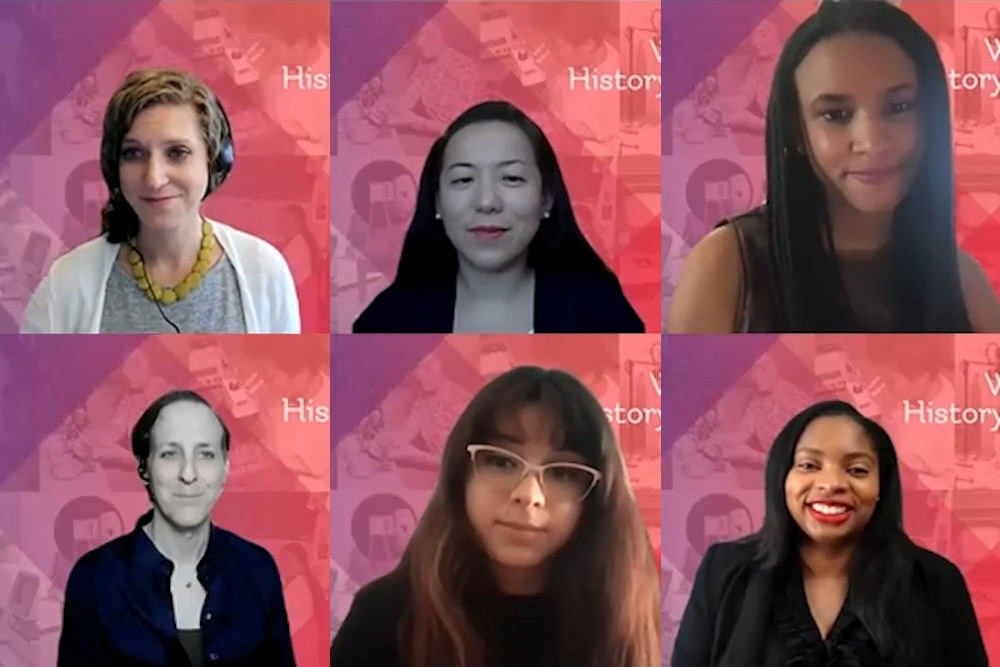Lincoln Laboratory celebrates 2022 Women's History Month

In celebration of this year's Women’s History Month, the Lincoln Laboratory Women's Network (LLWN) held an event on March 18 titled "Surviving the Pandemic: Stories of Resilience from Women at Lincoln Laboratory" highlighting the personal stories of five women who work at the Laboratory and how their intersectional identities have affected their lives.
The panelists' identities stemming from marginalized backgrounds have only intensified the challenges they face as women, especially during the pandemic. The event opened with thoughts from each of the panelists on their individual experiences, with a focus on some of the personal struggles that they have experienced as a result of their intersectional backgrounds.
"Over the last two years, I've experienced a lot of imposter syndrome, feeling like I couldn’t do enough," said Brittney Odoi, Senior Diversity and Inclusion Program Manager. "I am tired, but I will not stop. I am proud of how far I've come and I appreciate the opportunity to even share my story."
The event included a roundtable discussion where the panelists discussed the changing workplace. The first question touched on how they were each impacted by the pandemic, with a focus on mental health.
"The mental load of what it takes to successfully run a household, navigate life with kids, and be successful professionally… these challenges are not new to the pandemic, but are certainly exacerbated by it," said Chelsea Curran, Associate Technology Officer.
The panelists also shared ways that they each supported and cared for others during the pandemic. Multiple panelists examined the challenges they faced in keeping in touch with family members to ensure they were healthy and safe, and the concerns they faced as COVID-19 spread through the country. Madeline Beals, a technical staff member in the Advanced Concepts and Technologies Group, noted how personal relationships beyond just family supported her and many others through the pandemic.
"There's a much larger reliance on supporting each other through mental health, or through all the stress that is put on everybody," Beals said. "There is a big increase in how much we have been supporting and helping and carrying weight for other people and other friends in our lives, and they help carry ours, and we help carry theirs. But it's still an added challenge."
As the panelists discussed their experiences, audience members shared notes in the chat about their own experiences and offered support to the panelists for speaking out. "It really contributed to people collectively experiencing this event," said Jessica Kesner, Business Transformation Manager and co-chair of LLWN. "It was critical for people watching this to know others were experiencing what they were experiencing in hearing these stories."
Consuelo Cuevas, an assistant staff member in the Artificial Intelligence Technology Group, noted some challenges she has faced in the workplace as a result of her marginalized background, but also how her colleagues have supported her in her work and created new opportunities for her.
"When you’re marginalized, it can become extremely exhausting to constantly try to prove your worth to not only others, but many times even to yourself," Cuevas said. "Any time anyone has advocated for opportunities for me or acknowledged my ideas, it's meant a lot. Their support becomes imprinted in your mind. It's something that maybe people don't see, but internally it's something you carry."
Similarly, Adrienne Sands, a technical staff member in the Homeland Sensors and Analytics Group, spoke to the impact that her colleagues at the Laboratory have had on her as mentors.
"I often don't have all of the information I need in order to navigate the workplace," Sands said. "But I have mentors who are helping me navigate that. It has such a tangible impact on my self-esteem, the contributions I can make to my job, and my well-being."
Kesner, who organized the event, was proud of its reception and grateful to the panelists for being honest and vulnerable in the presence of their colleagues. After the event, multiple people reached out to tell Kesner that it was "really, really moving" and that the panelists' stories resonated with them.
"That kind of honesty and vulnerability does not happen every day at the Laboratory," Kesner said. "I was so proud of this event. Instead of concealing these lesser-discussed aspects of our lives, we embraced them head-on."
The Lincoln Employees African American Network, Hispanic/Latinx Network, Out and Proud Employee Network, and Pan Asian Laboratory Staff Network also helped organize this event, with Technical Communications also providing support.